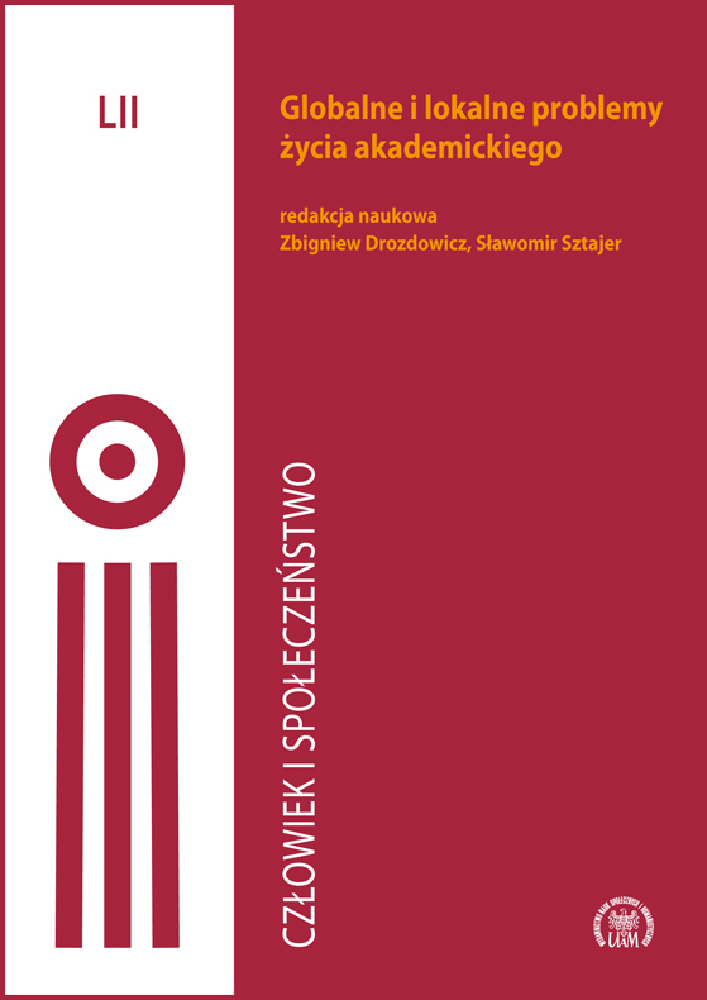Abstrakt
The subject of the text is the use of role models in building an academic culture of research integrity. We present some possible ways of involving them in teaching and promoting research integrity at universities. The acquired empirical results concern the qualities of a scientist worthy of emulation indicated by undergraduates, postgraduates and PhD students. The qualitative analysis of the collected data enabled us to describe two profiles of a good scientist: an accessible one, who sets an example to his/her mentees in a direct relationship, and a distant one, admired because of his/her work ethos and outstanding achievements. The research was conducted as an online survey in 2020 as part of the project
Bibliografia
ALLEA – All European Academies (2017). The European Code of Conduct for Research Integrity. Revised Edition. https://www.allea.org/wp-content/uploads/2017/05/ALLEA-European-Code-of-Conduct-for-Research-Integrity-2017.pdf (dostęp: 20.06.2021).
Anderson, M.S., Horn, A.S., Risbey, K.R., Ronning, E.A., De Vries, R., Martinson, B. (2007). What do mentoring and training in the responsible conduct of research have to do with scientists’ misbehavior? Findings from a National Survey of NIH-funded scientists. Academic Medicine: Journal of the Association of American Medical Colleges, 82(9), 853–860. https://doi.org/10.1097/ACM.0b013e31812f764c.
Bandura, A. (1986). Social Foundations of Thought and Action: A Social Cognitive Theory. Englewood Cliffs, NJ: Prentice Hall.
Babbie, E.R. (2014). The Basics of Social Research, 6th ed. Belmont, CA: Wadsworth, Cen-gage Learning.
Cotton, R.D., Shen, Y., Livne-Tarandach, R. (2011). On becoming extraordinary: The content and structure of the developmental networks of Major League Baseball Hall of Famers. Academy of Management Journal, 54(1), 15–46. https://doi.org/10.5465/AMJ.2011.59215081.
Delaney, N., Tornasi, Z., Monachello, R. (2020). Research ethics and research integrity: Achievements in Horizon 2020 and recommendations on the way forward. Publications Office of the European Union. https://data.europa.eu/doi/10.2777/63976 (dostęp: 20.06.2021).
Dwojak-Matras, A., Kalinowska K., Koterwas, A. (2020). Uczenie rzetelności naukowej jako dążenie do utopii. Strategie rozwoju kultury rzetelności naukowej na uniwersytetach. W: R. Włodarczyk (red.), Utopia a edukacja, t. 4 (ss. 245–261). Wrocław: Instytut Pedagogiki Uniwersytetu Wrocławskiego.
Fiske, S.T., Dupree, C. (2014). Gaining trust as well as respect in communicating to motivated audiences about science topics. Proceedings of the National Academy of Sciences, 111 (Supplement 4), 13593–13597. https://doi.org/10.1073/pnas.1317505111.
Gibson, D.E. (2004). Role models in career development: New directions for theory and re-search. Journal of Vocational Behavior, 65(1), 134–156. https://doi.org/10.1016/S0001-8791(03)00051-4.
Goćkowski, J. (1977). Funkcje autorytetów w społeczeństwie nauki. Teksty: Teoria Literatury, Krytyka, Interpretacja 1(31), 21–40.
Gray, P.W., Jordan, S.R. (2012). Supervisors and academic integrity: Supervisors as exemplars and mentors. Journal of Academic Ethics, 10(4), 299–311. https://doi.org/10.1007/s10805-012-9155-6.
Hackett, G., Betz, N.E. (1981). A self-efficacy approach to the career development of women. Journal of Vocational Behavior, 18(3), 326–339. https://doi.org/10.1016/0001-8791(81)90019-1.
Hyytinen, H., Löfström, E. (2017). Reactively, proactively, implicitly, explicitly? Academics’ teaching conceptions of research ethics and integrity. Journal of Academic Ethics, 15(1), 23–41. https://doi.org/10.1007/s10805-016-9271-9.
Jarreau, P.B., Cancellare, I.A., Carmichael, B.J., Porter, L., Toker, D., Yammine, S.Z. (2019). Using selfies to challenge public stereotypes of scientists. PLOS ONE, 14(5). https://doi.org/10.1371/journal.pone.0216625.
Kalinowska, K., Koterwas, A., Dwojak-Matras, A. (2020). The perception of Research Integ-rity and Ethical Training in the Academic community. Edukacja, 1(152), 42–53. https://doi.org/10.24131/3724.200103.
Kristjánsson, K. (2006). Emulation and the use of role models in moral education. Journal of Moral Education, 35(1), 37–49. https://doi.org/10.1080/03057240500495278.
López, B., Prieß-Buchheit, J., Guerette, J. (2020). Path2Integrity Campaign. Deliverable D2.2 EU Horizon 2020 Path2Integrity Project, Grant agreement No 824488. https://www.path2integrity.eu/documents (dostęp: 20.06.2021).
Löfström, E. (2012). Students’ ethical awareness and conceptions of research ethics. Ethics & Behavior, 22(5), 349–361. https://doi.org/10.1080/10508422.2012.679136.
Mead, G.H. (1934). Mind, Self, and Society from the Standpoint of a Social Behaviorist. Chi-cago: University of Chicago Press.
Nakamura, J., Condren, M. (2018). A systems perspective on the role mentors play in the cul-tivation of virtue. Journal of Moral Education, 47(3), 316–332. https://doi.org/10.1080/03057240.2018.1444981.
Nichols-Casebolt, A. (2012). Research integrity and responsible conduct of research. New York: Oxford University Press. https://doi.org/10.1093/acprof:oso/9780195378108.001.0001.
Prieß-Buchheit, J., Aro, A., Demirova, I., Lanzerath, D., Stoev, P., Wilder, N. (2020). Rotato-ry role-playing and role-models to enhance the research integrity culture. Research Ideas and Outcomes. https://doi.org/10.3897/rio.6.e53921.
Satalkar, P., Shaw, D. (2019). How do researchers acquire and develop notions of research integrity? A qualitative study among biomedical researchers in Switzerland. BMC Medical Ethics, 20(1), 1–12. https://doi.org/10.1186/s12910-019-0410-x.
Schunk, D.H. (1987). Peer Models and Children’s Behavioral Change. Review of Educational Research, 57(2), 149–174. https://doi.org/10.3102/00346543057002149.
Sumpter, J.P. (2019). What makes a good scientist? Karl Fent as an example. Journal of Haz-ardous Materials, 376, 233–238. https://doi.org/10.1016/j.jhazmat.2019.05.016.
Titus, S.L., Wells, J.A., Rhoades, L.J. (2008). Repairing research integrity. Nature, 453(7198), 980–982. https://doi.org/10.1038/453980a.
Znaniecki, F. (1973). Socjologia wychowania, t. 2: Urabianie osoby wychowanka. Warszawa: Państwowe Wydawnictwo Naukowe.
Licencja
1. W momencie złożenia pracy celem rozpoczęcia postępowania w sprawie publikacji, Licencjodawca, zwany dalej Autorem, akceptuje wszystkie zasady umieszczone na stronie internetowej czasopisma “Człowiek i Społeczeństwo”, udzielając Licencjobiorcy, zwanego dalej Wydawcą, niewyłącznej i nieodpłatnej licencji na korzystanie z Utworu. Licencja zakłada tym samym brak ograniczeń terytorialnych, czasowych oraz ilościowych na następujących polach eksploatacji (art. 50 ustawy z dnia 4 lutego 1994 r. o prawie autorskim i prawach pokrewnych):
a. utrwalanie Utworu;
b. zwielokrotnienie Utworu drukiem i w wersji cyfrowej;
c. wprowadzenie do obrotu, użyczenie lub najem oryginału/zwielokrotnionych egzemplarzy Utworu;
d. publiczne wykonanie, wystawienie, wyświetlenie, odtworzenie oraz nadawanie i reemitowanie, a także publiczne udostępnianie Utworu w taki sposób, aby każdy mógł mieć do niego dostęp w miejscu i w czasie przez siebie wybranym;
e. włączenie Utworu w skład utworu zbiorowego;
f. wprowadzenie Utworu w postaci elektronicznej na platformy elektroniczne lub inne wprowadzenie Utworu w postaci elektronicznej do Internetu, Intranetu, Extranetu lub innej sieci;
g. rozpowszechnianie Utworu w wersji elektronicznej w Internecie, Intranecie, Extranecie lub innej sieci, w pracy zbiorowej, a także samodzielnie w formule Open Access w oparciu o licencję Creative Commons Uznanie autorstwa 4.0 Międzynarodowa Licencja Publiczna (CC BY 4.0), a także inną wersję językową tej licencji, lub którąkolwiek późniejszą wersję tej licencji.
2. Założenia licencji Creative Commons Uznanie autorstwa 4.0 Międzynarodowa Licencja Publiczna (CC BY 4.0), udzielają Wydawcy upoważnienia do kopiowania, zmieniania, rozprowadzania, przedstawiania i wykonywania Utworu jedynie pod warunkiem uznania autorstwa.
3. Wraz z dostarczeniem Utworu, Autor zobowiązuje się do wypełnienia, podpisania oraz odesłania skanu umowy

